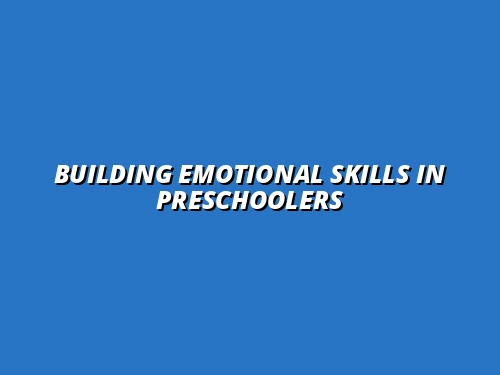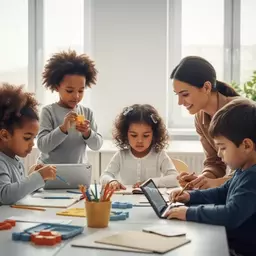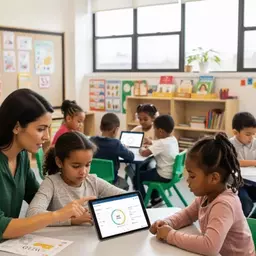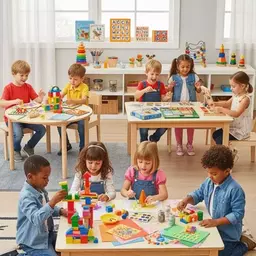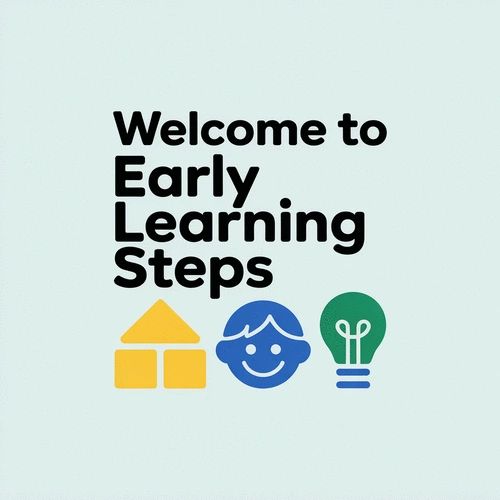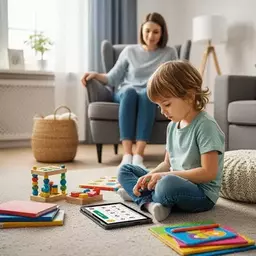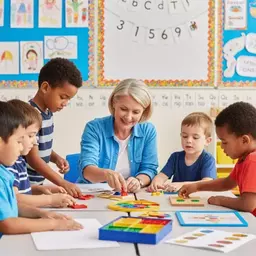What if you could equip preschoolers with the skills they need to thrive emotionally and socially? Emotional intelligence is not just a buzzword; it's a vital component of early childhood development that can shape the future of our children. By nurturing their emotional skills, we empower them to navigate life's challenges with confidence.
What You Will Learn
- Understanding the core components of emotional intelligence in preschoolers, including self-awareness, self-regulation, empathy, and social skills.
- Recognizing the significance of emotional intelligence in enhancing social skills, communication, and conflict resolution among young children.
- Learning how to support emotional intelligence through intentional activities and cooperative play in both classroom and home settings.
- Realizing the long-term benefits of fostering emotional intelligence, including improved academic performance, better relationships, and increased resilience.
Key Components of Emotional Intelligence in Preschoolers
Emotional intelligence is foundational for future social interactions, academic success, and overall well-being. Below are its core components, vital for early development, and are essential for fostering emotional intelligence in kids.
Self-Awareness
Recognizing their emotions and understanding how they affect their behavior.
Self-Regulation
Managing their emotions appropriately, especially in challenging situations.
Empathy
Understanding the feelings of others and responding compassionately.
Social Skills
Building friendships, communicating effectively, and resolving conflicts.
Understanding Emotional Intelligence in Preschoolers
Emotional intelligence (EI) is a crucial aspect of early childhood development that plays a significant role in how our little ones interact with the world around them. EI encompasses the ability to recognize, understand, and manage emotions—both in themselves and in others. For preschoolers, developing emotional intelligence is foundational, as it sets the stage for their future social interactions, academic success, and overall well-being.
As an advocate for early childhood education, I have seen firsthand how nurturing emotional intelligence can transform a child's learning experience. Preschoolers equipped with strong EI are better prepared to handle challenges, express themselves, and build healthy relationships. Isn’t it empowering to know that we can support this growth?
Defining Emotional Intelligence and Its Significance
So, what exactly does emotional intelligence look like in preschoolers? It involves several key components, including:
- Self-awareness: Recognizing their emotions and understanding how they affect their behavior.
- Self-regulation: Managing their emotions appropriately, especially in challenging situations.
- Empathy: Understanding the feelings of others and responding compassionately.
- Social skills: Building friendships, communicating effectively, and resolving conflicts.
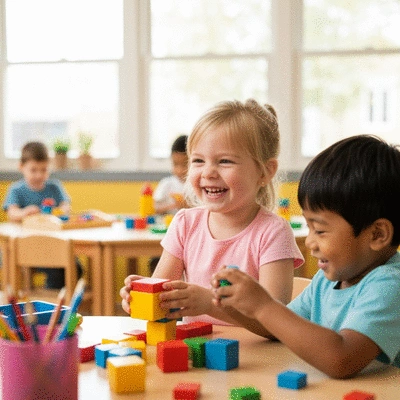
These skills are vital because they not only help children navigate their immediate environments but also foster resilience and adaptability as they grow. As educators and parents, we have the opportunity to nurture these traits through intentional activities and supportive interactions, much like the principles of parenting tips for emotional growth.
The Role of Emotional Intelligence in Social Development
Emotional intelligence significantly influences social skills and confidence among young children. When preschoolers learn to recognize and regulate their emotions, they become more adept at interacting with their peers. Think about it—how many times have you witnessed a child successfully navigating a friendship issue because they understood their feelings?
Here are some ways that EI contributes to healthier social development:
- Improved communication: Children who can express their emotions clearly are more likely to build strong relationships.
- Conflict resolution: EI encourages constructive approaches to disagreements, fostering cooperation and teamwork.
- Increased empathy: As children learn to understand others' emotions, they develop deeper connections and friendships.
By focusing on emotional intelligence, we can help preschoolers become confident individuals who are not just aware of their own feelings, but also the feelings of those around them, paving the way for a kinder, more empathetic world.
Interactive Poll: Share Your Thoughts!
As we explore the impact of emotional intelligence in preschoolers, we want to know—what strategies have you found most effective in nurturing these skills? Select your answer below:
Reinforcing the Importance of Emotional Intelligence in Early Childhood
As we navigate the world of early childhood education, it's essential to recognize the critical role that emotional intelligence plays in preschoolers' overall development. Children who develop strong emotional skills are better equipped to handle their feelings, build relationships, and engage with the world around them. By fostering emotional intelligence, we set the foundation for confident, curious learners who can thrive in diverse environments.
Research shows that emotionally intelligent children are not only more successful academically but also exhibit improved social skills and emotional well-being. This is why, at Early Learning Steps, we emphasize the significance of emotional intelligence in early education, as it contributes to a child's ability to express emotions constructively and empathize with others.
- Enhanced Communication: Children learn to articulate their feelings and needs.
- Better Relationships: Strong emotional skills lead to healthier friendships.
- Resilience: Emotionally intelligent children bounce back from challenges more effectively.
- Confidence: Understanding emotions helps them feel secure and valued.
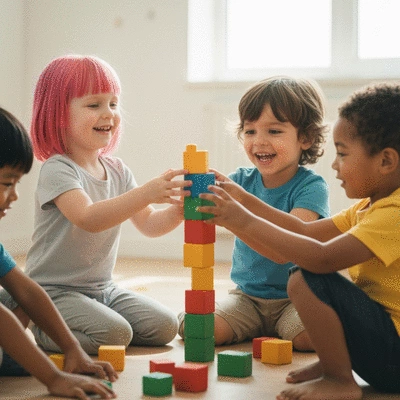
By reinforcing emotional intelligence in preschoolers, we are not just teaching them to recognize feelings; we are equipping them with lifelong skills that will serve them well throughout their journey in life.
Encouraging Active Participation in Emotional Learning Through Cooperative Play
Now that we understand the importance of emotional intelligence, let’s delve into how we can encourage active participation in emotional learning through cooperative play. I encourage you to implement the discussed activities, both in classrooms and at home, as they provide valuable opportunities for children to practice these essential skills. Cooperative play not only engages children but also nurtures their ability to work together, share, and empathize with their peers.
Here are some benefits of incorporating cooperative play into your routine:
- Social Skills Development: Children learn to communicate and collaborate effectively.
- Emotional Awareness: They gain insights into their own feelings and those of others.
- Problem-Solving Skills: Working together helps them navigate challenges creatively.
- Inclusivity: Cooperative play fosters a sense of belonging among children.
At Early Learning Steps, we believe that by creating environments where children can actively participate in their emotional learning, we’re helping them build a strong foundation for their future. Let’s work together to nurture emotionally intelligent learners!
Frequently Asked Questions About Emotional Intelligence in Preschoolers
What is emotional intelligence (EI) in preschoolers?
Emotional intelligence in preschoolers refers to their ability to recognize, understand, and manage their own emotions, as well as to understand and respond to the emotions of others. It includes self-awareness, self-regulation, empathy, and social skills.
Why is emotional intelligence important for early childhood development?
EI is crucial for early childhood development because it lays the foundation for future social interactions, academic success, and overall well-being. It helps children navigate challenges, express themselves effectively, build healthy relationships, and develop resilience.
What are the key components of emotional intelligence in preschoolers?
The core components include self-awareness (recognizing their own emotions), self-regulation (managing emotions appropriately), empathy (understanding others' feelings), and social skills (building friendships, communicating, and resolving conflicts).
How does emotional intelligence impact a preschooler's social skills?
EI significantly enhances social skills by improving communication, fostering conflict resolution through constructive approaches, and increasing empathy, which leads to deeper connections and healthier friendships among peers.
How can parents and educators foster emotional intelligence in preschoolers?
Emotional intelligence can be fostered through intentional activities, cooperative play, encouraging open communication about feelings, role-playing scenarios, and providing a supportive environment where children feel safe to express their emotions. Resources like play-based learning and cognitive growth can also be highly beneficial.
Join the Conversation on Emotional Learning and Character Education
I invite you to share your experiences and insights on fostering emotional intelligence and character education. What activities have you found effective? How do you encourage emotional learning in your home or classroom? Your stories can inspire others and create a vibrant community dedicated to nurturing the emotional well-being of our young learners!
Recap of Key Points
- Emotional Intelligence (EI) is crucial: EI helps preschoolers recognize, understand, and manage their emotions, forming the basis for their social interactions and overall development.
- Key components of EI: Self-awareness, self-regulation, empathy, and social skills are essential for preschoolers to navigate their emotions and relationships.
- Role in social development: EI enhances communication, conflict resolution, and empathy, enabling children to build stronger relationships.
- Cooperative play promotes emotional learning: Engaging in cooperative play helps children develop social skills, emotional awareness, and problem-solving abilities.
- Long-term benefits: Nurturing EI leads to better academic performance, healthier relationships, and increased resilience in children.

